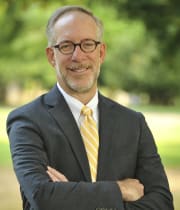CEO Message: Learning from Dr. Martin Luther King Jr.

By Bill Robertson, President and CEO
Today is the Martin Luther King Jr. federal holiday. On Wednesday, Jan. 15, Dr. King would have celebrated his 91st birthday. Dr. King was a minister, activist and outspoken leader in the American Civil Rights Movement through the 1950s and 1960s until his assassination on April 4, 1968. Reflecting on Dr. King’s legacy, perhaps three words bring into clearer focus the impact of his life and work.
The first word is collaboration (one of the guiding values of MultiCare). Throughout his life, one of the hallmarks of his success was his ability to bring disparate groups to the same table for greater impact through collaborative action. Those who came together in support of his work of non-violent protest were conservative and progressive, old and young, religious and secular, black and white. One of the most famous pictures of Dr. King shows him leading the march from Montgomery to Selma, his arms interlocked with a row of leaders including John Lewis; Ralph Bunche, former U.S. ambassador to the UN; and Rabbi Abraham Joshua Heschel. They are wearing flower leis — a gift to the march organizers from a delegation from Hawaii. Dr. King understood the word collaboration.
Dr. King embraced the value of compassion, which is integral to our MultiCare value of respect. In a remarkable maturing that he experienced while seeking to lead the civil rights movement, Dr. King revealed his own journey toward an understanding of compassion:
“I have moved to break the betrayal of my own silences and to speak from the burnings of my own heart.”
“An individual has not started living until he can rise above the narrow confines of his individualistic concerns to the broader concerns of all humanity.”
“Never, never be afraid to do what’s right, especially if the well-being of a person or animal is at stake. Society’s punishments are small compared to the wounds we inflict on our soul when we look the other way.”
Ultimately, this broadened view of the brotherhood of all people — fueled by his deep commitment to a society and culture rooted in compassion and love — can be seen as the foundation for his seminal leadership in the struggle for civil rights, the third word beginning with C at the heart of the life and work of Dr. Martin Luther King, Jr:
“Nonviolence is absolute commitment to the way of love. Love is not emotional bash; it is not empty sentimentalism. It is the active outpouring of one’s whole being into the being of another.”
“I refuse to accept the view that mankind is so tragically bound to the starless midnight of racism and war that the bright daybreak of peace and brotherhood can never become a reality … I believe that unarmed truth and unconditional love will have the final word.”
“The time is always right to do what is right.”
These soaring ideals still challenge us. They stir our hearts and minds and hands to action. They are a call to fulfill the promise of our humanity and our democracy.




